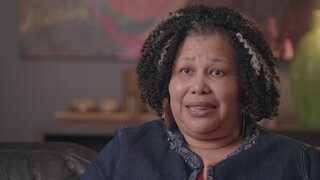Create a free profile to get unlimited access to exclusive videos, breaking news, sweepstakes, and more!
Jessica Chambers: Speech Experts Weigh In On The Reliability Of Her Accusation "Eric Did It"
Speech Pathology is set to be a big issue in Quinton Tellis's second murder trial. Could it convict or exonerate him?
When emergency workers found Jessica Chambers stumbling on the side of the road with more than 93 percent of her body burned she told them something that would come to dominate the case: “Eric did it.”
At trial, eight first responders testified she said this—one wasn’t sure if she said “Eric” or “Derek”—multiple times before she died. But the man prosecutors believe killed her is named neither Eric nor Derek. His name is Quinton Tellis.
The case will be looked at anew in the upcoming Oxygen docu-series “Unspeakable Crime: The Murder of Jessica Chambers.”
During Tellis’s murder trial last year, prosecutors tried to sow doubt over whether Chambers’ words could be trusted since she was suffering such severe medical trauma.
The first trial ended in a mistrial and now prosecutors plan to try Tellis for the crime again and, this time, use a speech pathologist to help bolster their case. To get a sense of how speech pathology might influence a second trial, Oxygen.com spoke to several speech experts about the details of the case.
Before we dive into speech pathology, here are the details you need to know:
Jessica Chambers was set on fire in her car on December 6, 2014 in Courtland, Mississippi. First responders found her soon after, staggering nearby. They asked her several questions, including, “Who did this to you?” She told them, “Eric did it,” several times, according to witnesses.
Chambers was also able to tell them her name, that her attacker was black and that she recognized one of the emergency workers on the scene. After that her condition deteriorated and she began repeating the phrase “I’m cold,” before being taken to a burn center where she died later that night.
Since the first trial, prosecutor John Champion has been accused of pressuring a man facing a capital murder trial to testify that Chambers referred to Tellis as “Eric.” But no evidence that Chambers ever referred to Tellis by anything other than his name has surfaced. At trial, his attorney Darla Palmer said, “Eric is not on trial today, but ladies and gentlemen he should be.”
The bar for determining whether it is possible to be sure of a person’s meaning when they are experiencing a medical trauma is very high, according to Joanne Lasker, a professor of speech pathology at Emerson College. Based on the facts she knows of the case, she said it is not possible to say with certainty that Chambers meant to say, “Eric did it.”
There are three elements, Lasker said, to evaluating what Chambers said that night: Cognition, language and speech.
“With cognition, we’re trying to determine whether her thoughts were coherent,” Lasker said. From a language perspective, “we need to know if she has the ability to call up the word she wants to use. Then speech-wise, it’s a question of can she physically articulate the words.”
From a cognition perspective, it seems Chambers was at least somewhat coherent, said Lasker. We know this because she was able to identify herself, recognize someone on the scene and say that her attacker was black. But for Lasker, that’s not enough to prove she definitely understood the question of who attacked her.
As for language, Lasker said the evidence is also lacking. Patients experiencing trauma often say one word when they actually mean another, she said. Repeating words—as Chambers did with “Eric”—can also be a sign of mental deterioration. To say with any certainty whether Chambers meant to say “Eric,” a speech pathologist would need to be on the scene and ask several other questions to evaluate Chambers’ cognitive and language ability.
The fact that she repeatedly answered “Eric” when asked who attacked her “adds maybe a little bit of credence” to the idea that Chambers was cognitively and linguistically able to answer the question, Lasker said. But patients repeating a word can also be a sign of mental deterioration called perseverating, she pointed out.
When it comes to the third criteria of speech, Lasker is fairly certain Chambers would have had the physical ability to say “Eric.” Since Chambers had already told first responders that her name was “Jessica Chambers” and answered other questions, Lasker concludes Chambers was indeed saying “Eric,” and not another word or name as prosecutors previously argued.
Prosecutor John Champion posited during the last trial that maybe Chambers was trying to say “Tellis,” but could not make a “t” sound. “I’m not saying it’s impossible, but that’s a stretch,” said Lasker.
Adam Buchwald, a professor of communicative science at New York University, agrees that Chambers likely had the physical ability to say the name “Eric.”
“All of the word ‘Eric’ is produced inside the vocal tract and not with the lips. If all of the burning was on the outside of her body, you would have to presume she would be able to say that name if she wanted to,” he said. Her ability to say her own name backed up that assertion, he said.
An autopsy of Chambers found that she suffered from soot inhalation, but it did not indicate internal thermal injuries. She did, however, suffer injuries to her tongue and mouth.
While Lasker believes it’s impossible to be certain that Chambers actually understood the question or meant to say “Eric,” she’s equally unprepared to deny that Chambers said exactly what she meant to.
“It’s a really high bar,” she said. “There are myriad ways that speech, language, and cognition effect what a person says. To make a definite judgment about any one statement we really need a lot of information.”
But Lasker added that the bar for proving Tellis’s guilt should be just as high. “If you are going to convict someone of murder, you have to be absolutely certain,” she said.
Tellis’s new trial is set to begin on September 24.
[Photo: Oxygen]
































